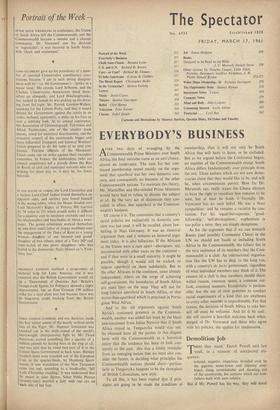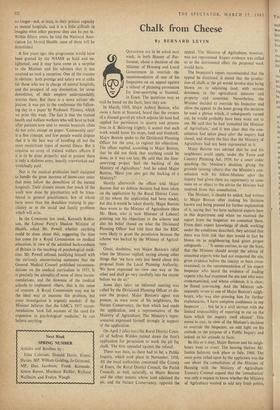Demolition Job
THERE they stand,' Enoch Powell said last I week, in a moment of unexpected elo-
isolated, majestic, imperious, brooded over by the gigantic water-tower and chimney com- bined, rising unmistakable and daunting out of the countryside, the asylums which our fore- fathers built with such solidity.
But if Mr. Powell has his way, they will stand no longer—not, at least, in their present capacity as mental hospitals, and it is a little difficult to imagine what other purpose they can be put to. Within fifteen years, he told the National Asso- ciation for Mental Health, most of them will be demolished.
A few years ago, this programme would have been greeted by the NAMH as bold and en- lightened; and it may have come as a surprise to the Minister and his advisers that it has received so cool a reception. One of the reasons is obvious: both prestige and salary are at stake for those who are in charge of mental hospitals, and the prospect of any diminution, let alone demolition, of their empires understandably worries them. But there is a more serious ob- jection; it was put to the conference the follow- ing day in a paper by Professor Titmuss, which we print this week. The fact is that the trained health and welfare workers who will have to look after patients now sent to mental hospitals often do not exist, except on paper. 'Community care' is a fine concept, and few people would dispute that it is the best way of handling all but the most recalcitrant types of mental illness. But it requires an army of trained welfare officers if it is to be done properly; and at present there is only a skeleton army, heavily overworked and wretchedly paid.
Nor is the medical profession itself equipped to handle the great increase of home-care cases that must follow the demolition of the mental hospitals. Their closure means that much of the work now done by psychiatrists will be trans- ferred to general practitioners, few of whom have more than the sketchiest training in psy- chiatry or in the social and family problems which will arise.
In the Commons last week, Kenneth Robin- son, the Labour Party's Shadow Minister of Health, asked Mr. Powell whether anything could be done about this, suggesting the time has come for a Royal Commission on medical education, in view of the admitted backwardness of Britain in the teaching of psychological medi- cine. Mr. Powell refused, justifying himself with the curiously unconvincing statement that the General Medical Council published recommen- dations on the medical curriculum in 1957. It is precisely the unreality. of some of these recom- mendations, and the slowness of the medical schools to implement others, that is the cause of concern. A Royal Commission may not be the ideal way to examine this problem, but some investigation is urgently needed: if the Minister believes that the GMC's 1957 recom- mendations 'took full account of the need for expansion in psychological medicine,' he can believe anything.







































 Previous page
Previous page